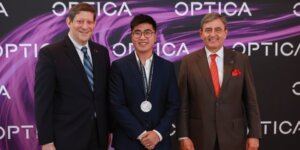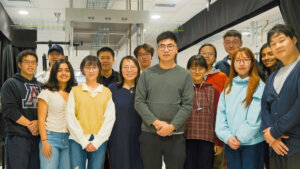
Prof. Zaijun Chen (center) being honored with an Optica Foundation Challenge prize at the Frontiers in Optics + Laser Science Conference in Tacoma, Washington, on Oct. 10, 2023. At the left is ECE Prof. Alan Willner, and to the right is foundation president Eric Mazur. (Credit: Optica)
The Internet of Things (IoT) is expected to grow to an $800 billion industry this year, a 10.6% increase from last year. All that data, and the electricity needed to keep it flowing, is straining the system, creating a need for more efficient solutions.
Zaijun Chen, a research assistant professor at the USC Viterbi Ming Hsieh Department of Electrical and Computer Engineering, is working on combining optical edge sensing with photonic deep learning to speed up networks supporting consumer products.
Chen’s work has earned him plenty of recognition, most recently a 2023 Challenge grant from the Optica Foundation and a Faculty Innovation Award from the Sony Group.
“In today’s existing process, optical signals need to be converted to the electrical domain as part of the flow of information,” the Optica Foundation announcement states. “Chen proposes a novel, smart optical sensor that can detect and process optical signals without the need for conversion, thus reducing energy consumption, latency, data traffic, and sensor footprint by orders of magnitude.”
“What I’m doing is optical computing for machine learning and AI applications,” Chen said. “This is the first time we’re combining optical sensing and machine learning into one project.”

Prof. Zaijun Chen (center) with team members of the Intelligent and Quantum Photonics group. (USC Photo: Qi Wang)
Chen hopes to have a prototype of the first smart sensing device ready soon, and to start training that device on machine-learning models that can address specific IoT needs.
The other Optica Foundation Challenge recipient is Alejandro Velez-Zea of the Universidad de Antioquia, Colombia. He is working on reducing the cost of augmented and virtual reality systems.
“The growing use of ‘smart’ consumer technologies and augmented and virtual reality is simultaneously maxing out bandwidth and driving a desire for better experiences,” Ulrike Woggon, a member of the Optica Challenge selection committee, said in a statement. “Drs. Chen and Velez-Zea are introducing unique, innovative ways to address these issues by lessening the network burden and creating more seamless interactions and realistic environments.” Optica, founded in 1916, is a society dedicated to the science of light.
Chen’s grant from Sony involves “developing a general-purpose computing hardware that could accelerate AI,” he said.
Published on January 10th, 2024
Last updated on March 7th, 2024













